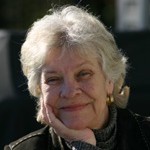When Patricia MacLachlan was a young girl, she remembers one special walk on the prairie with her mother. “My mother looked down at her foot prints, and said, ‘Somebody may have walked here or maybe no one ever has. Either way it’s history.’” MacLachlan always knew she wanted to write, but in that moment she felt connected. “There were people before me and there were people who would come after, and I think that is what I needed to write.” She saves bags of prairie dirt to remind her of this simple, yet life-changing walk.
MacLachlan attributes her love of books and reading to her parents. Although an only child, she never felt alone. Cousins and neighborhood kids gathered at her house “because they liked my parents best,” she says. MacLachlan also entertained a cast of imaginary friends that became as close to her as brothers and sisters. Now, she sees a lot of herself in her five grandchildren who also converse with imaginary playmates and love to read.
When MacLachlan’s now-grown son was ten, she remembers showing him a story she had written for possible publication. She first began to think of herself as a writer when he said, “Wow! Did you copy this or make it up?” She enrolled in a class taught by Jane Yolen who championed MacLachlan’s first book, The Sick Day (1979). Now over thirty years later, Yolen and MacLachlan belong to the same writers group where they comment on each other’s work.
Since the release of The Sick Day, MacLachlan steadily produces about one book each year, but feels particularly productive these last couple of years. “Maybe I’m trying to get everything done before I die,” quips the 70-year old Newbery Medalist. On a more serious note, she credits her surge in publications to the fact that her son, daughter-in-law, and two grandchildren now live with her. “My audience is center stage,” she says of her front row seat to the children’s antics and fears.
Connectedness is a theme that runs through MacLachlan’s work. Nora’s Chicks reminds her of her grandmother from North Dakota who emigrated from Russia. Kindred Soulscelebrates her father who was born in a sod house and lived his 102 years filled with joy. In What Do You Know First, she recalls leaving the prairie to settle in Massachusetts.
“The stories in my life tap me on the shoulder,” MacLachlan says. “I write about things I’m worried about and things that my children or grandchildren are worried about. I write them to brush them off my shoulder. That sounds weird and kind of self-serving, but I think that’s true. Who was it who said we write about our lives in our books so we don’t have to make the same mistakes again? I think it was John Gardiner. And that’s a great [quote] because your ego is involved. You are writing for you, to comfort you, to think about why you feel anger or worried about loss.”
One particularly special feature in many of MacLachlan’s books is the relationships between old and young characters. “I have always thought that old and young have a lot in common,” she says. “There is a certain freedom of expression that the old have and they’re willing to state their case and be honest, and children are that way, too.”
In one fan letter that MacLachlan taped to her refrigerator for inspiration, a young reader named Donald said, “I have read Sarah, Plain and Tall. It is the second to the greatest book I’ve ever read.” A young girl said, “You’re married and I’m not. What’s it like?” MacLachlan carefully crafts her responses to these letters, taking their questions, worries, and comments to heart.
According to MacLachlan, “The Boxcar Children Beginning was kind of an experiment for me, to open a door and walk through it. Those weren’t my characters, but I liked the children and I knew what kind of parents they had. I had to kind of invent them and get rid of them.” Reviewers pooh-poohed the idea of readers needing to know what happened to the Alden parents to leave the children orphaned and living in a boxcar. “But kids needed to know,” MacLachlan says. “They asked me did the parents abandon them?” MacLachlan created an accident, which sits much better with her readers than abandonment.
MacLachlan jokes that she goes to bed earlier than her grandchildren do, but she rises at 5:00 a.m. “I’m smart early in the morning,” she says. “My mind is uncluttered and I write until noon.” As she writes a book, she cannot begin chapter two until chapter one is just right. In her words, “the process is organic; it grows like a flower unfolding. I usually know the end of a book when I start, but I don’t know how I’m going to get there.” By the time she sends it to her editor, she hopes for few revisions. “Revisions are like short punches to the chest,” she says. For a brief moment she is annoyed and angry, but revises like a true professional.
“I write to make sense of my life,” MacLachlan says, “and I want children to know that I don’t get it right the first time.”


